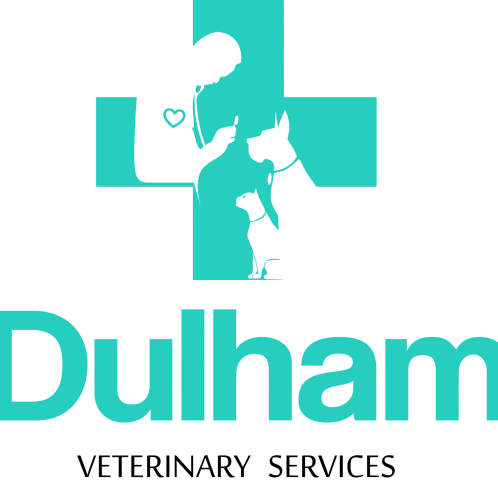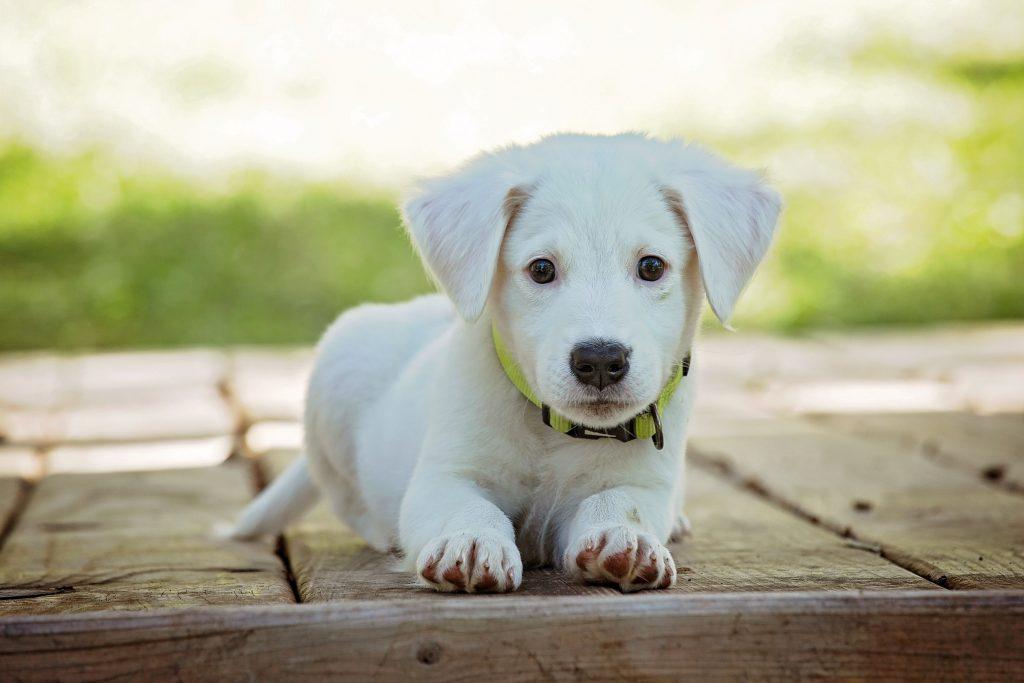A Complete Guide on Puppy Care for First-Time Owners
Puppies are lovely and cuddly, and bringing one into your life can be exciting. However, it is no simple task to raise a puppy as a first time dog owner. New pups have many needs and it can turn into a frustrating experience quickly if you don’t know what to do.
From the moment of birth until they are ready to go outside and be independent, there are many things you’ll need to learn. This guide will teach you everything you need to know about caring for your puppy so that they become a member of your family and feel safe and loved.
How to get a puppy and factors to consider when choosing one
There are many different ways you can get a puppy for your home:
- Buy from a breeder or pet store
Certain pet stores or veterinary clinics like Dulham Veterinary Services have puppies available for sale. You will need to look through all of the dogs at the shelter, then decide on one that meets your criteria. After that, you will need to take them home and train them.
- Adoption
Another option is to adopt from individuals who can no longer properly care for them either because they are travelling or don’t have the resources to do so.
- Rescue from an animal shelter
You can also rescue a pet from a rescue group or an animal shelter in your area. These groups often have dogs available for adoption that have been rescued from shelters or have been surrendered by their owners because they can no longer care for them properly or at all.
While these options are great ways to own a pet, it is important to ensure that you’re getting a puppy that is suitable for your home and has no health issues.
So what should you consider when selecting a puppy for your home?
- Size of dog to size of home ratio
First things first: what breed of dog are you looking to get? Your puppy is going to grow up into a dog someday, so while you think your home is spacious enough for a little pup to run around and play all day, you also have to consider the future. The space might be large enough for them now, but what about in years to come? So again, what breed of dog are you looking to get?
For smaller homes like apartments, smaller dog breeds that don’t require much space and exercise like Shih Tzus are a great choice, but for a larger breed with a ton of exercise requirements like a German Shepherd, a home with tons of indoor and outdoor space is a necessity. So before choosing your puppy, look at the size of your home and analyse how well it will serve your pup in the following years.
- General temperament
The temperament of your puppy also matters in the grand scheme of things. This is because some dog breeds are considered more outgoing and friendly, while other breeds can be considered antagonistic. Choosing a puppy based on its temperament translates to your reasons for choosing the dog.
For instance, do you require a guard dog? A fearless, loving protector for your family unit? If yes, then choosing a puppy from a breed with the natural instinct to protect their home and family from threats, like a Boerboel, is the way to go. On the other hand, if you’re looking to get a more friendly dog that will simply serve as a furry companion for your family, a breed like the Lhasa Apso is your best bet.
Of course, your puppy’s temperament doesn’t only depend on its breed. The disposition of every dog varies individually, so the best way to know your puppy’s character is to spend time with them. And remember, the younger the puppies are, the easier it is to mould their temperament via training and socialization!
- Family unit compatibility
The puppy you choose must also be compatible with your family unit. For instance, pairing a reserved, overprotective dog with a socially active family will only serve to agitate the dog whenever the family decides to host gatherings. Or in the instance that a member of the family is allergic to dogs, selecting a puppy from a non-hypo-allergenic breed would be disastrous.
Your pup should be able to integrate seamlessly into your family. Choose a puppy that suits all the needs of your family. A socially active family should be paired with a friendly, outgoing dog. A hypo-allergenic breed of dog would suit a family where animal allergies exist. An active family will need a puppy that is energetic and just as active. All in all, selecting a puppy by assessing the needs of your family unit guarantees that everyone enjoys the love and companionship of your pup.
- Cost
Puppy care can be expensive, and that’s why cost is a very important factor to consider. For you to take care of your puppy, you should be willing to spend on it. You’ll need a multitude of supplies that cost a pretty penny. Food, toys, accessories like leashes and collars, and grooming supplies like shampoo and toothbrushes are necessities to take care of a puppy’s daily needs. You’ll also have to factor in other costs like vaccinations, medical fees, and even pet boarding prices in times of emergency getaways when you can’t bring along your furry companion.
Related: How to Choose an Affordable and Safe Pet Boarding Facility For Your Pets.
All puppies have needs, but these needs vary from pup to pup. Some puppies may need extra medical care and larger food portions compared to others. You have to consider your pup and their needs, and check if your financial situation can sustain a comfortable lifestyle for your puppy in the long run.
List of puppy essentials
Now that we’ve gone through the factors you need to consider when choosing your puppy, let’s talk about the essentials your pup will need to get settled in their new home!
- Food and water bowls
It’s important to use bowls to feed your pup. Food bowls help to control the portions of food your pup will eat, thus preventing them from overeating. Serving your pup in a bowl also keeps their food clean and prevents them from playing with it and making a mess. Studies have shown that stainless steel bowls are the safest option for your pets because stainless steel collects fewer bacteria compared to other materials.
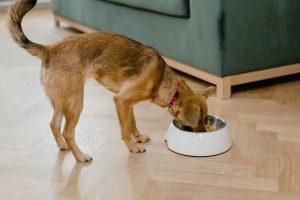
- Food
This is one of the more important puppy essentials. Food is a sensitive matter for puppies, and buying the right puppy food can be daunting for first-time owners. After all, there are so many brands of puppy food out there. Discuss with your veterinarian the best food to meet your puppy’s nutritional needs, and if necessary, purchase puppy food labelled as balanced for puppies at all stages of life.
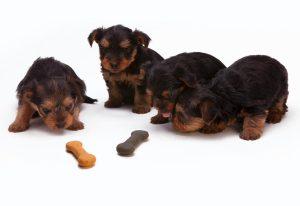
- Dog crates and bedding
Puppies are more susceptible to cold than adult dogs because they are smaller in size. To combat the chill, it’s essential to get them a crate and in some cases, bedding. Crates provide a thick layer of insulation between your pup and the floor, making it a warmer and more comfortable spot for your pet to rest. Beddings are essential to help provide more warmth for your pup, but beware—puppies love to chew and nibble, so the bedding might not be a completely safe option for your furry companion. Pick bedding made of materials that aren’t easy for puppies to tear apart and ingest.
- Collars and ID tags
These are essential to insure your pup’s security. Puppies tend to get lost, and sometimes, stolen. By putting a collar on your pup, it’ll be easier to find and identify them. ID tags with the pup’s name, your contact information and address will also make it easier for your pup to find their way back to you.
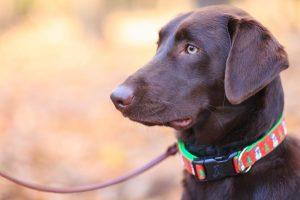
- Chew toys
As your pup loses their baby teeth and grows out their adult teeth, they will literally nibble at anything they can get their paws on, from furniture to even your shoes! This is because there will be discomfort in the gums and the only way to relieve this discomfort is by chewing on things. This can lead to the destruction of property. A good chew toy will help to prevent this destructive puppy behaviour and also provide relief for your pup’s gums.
- Poop bags and cleaning products
No matter how well potty trained your pup is, accidents can still happen. In light of this, you’ll need poop bags to pick up after your pet’s accidents. Also, stock up on cleaning products that are effective against excrement stains and odours to achieve a nice-smelling environment for you and your pup to coexist in.
- Dog toothpaste and toothbrush
A good dental hygiene routine for your pets can lead to them living a longer, healthier life. There are specific kinds of toothpaste and toothbrushes designed to clean a puppy’s teeth. You can test out the various toothbrush textures and toothpaste flavours with your pup to know what they like best and make brushing more enjoyable for them.
- Dog shampoo
Keeping your pup clean is another way to ensure they live a healthy life. Bathing your dog with a specially formulated puppy shampoo will clean and protect its fur and skin. Make sure to only use shampoo for dogs. Dog shampoo is gentle and retains its natural oils, making their skin and fur healthy. Human shampoo can prove harmful to your puppy. There are different brands of puppy shampoo out there, so select the one that best fits your dog’s skin and fur needs!
- Brush
A brush is essential for your pup’s grooming needs. Brushing your dog’s fur every day will help to prevent matting and reduce shedding. It will also keep your pup looking cuter and well-taken care of!
- Leash
Leash-training a puppy is essential. A leash can restrict your pup’s movements, but it also provides security. Pups are notorious for being curious and wanting to explore, and while this is a good trait, it can also prove dangerous. Get a good leash that your puppy can’t break out of and explore with them. This will create good bonding moments between you and your pup and also help you keep it out of trouble.
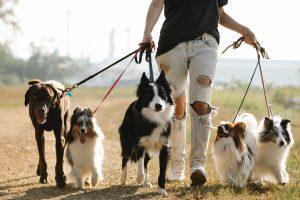
How to care for puppies
- Potty training
To make potty training easier for you and your pet, make a potty schedule. Puppies do well when there’s a regular routine or schedule to follow. It lets them know the right times to eat, play and do their bathroom business. By adhering to a strict potty-training routine, you’re letting your pup know the right time to relieve themselves.
For this routine to be foolproof, you’ll also have to control some other factors. Feeding your puppy at the same time every day will make it more likely that they’ll need to relieve themselves at consistent times as well, making potty training easier for both of you. Picking a particular spot and leading your pup there anytime they need to do their business will let them know that spot is their bathroom, thereby eliminating the potential risk of them pooping in areas they shouldn’t. Limit their water intake to two hours before bedtime to reduce the likelihood of your pup needing to relieve themselves at night. Remember to take your dog outside for bathroom breaks on a regular basis. Letting them know that outside is where they should do their business will save your home from a lot of poop and pee in the long run!
- Socialising
Regardless of your pup’s temperament, whether they are outgoing or reserved, socialising your puppy can help to correct negative behavioural habits and make your dog more friendly, confident and prepared for the outside world. A puppy that lacks experience with the outside world is more likely to grow up anxious and scared.
This is why socialisation is important. Taking your dog out to try out new experiences and meet new people will help to positively influence how your pup feels about humans, dogs, other animals, and other circumstances.
Visit dog parks and participate in social events like dog shows. It’s also important to let your puppy get comfortable with other humans, so visiting other homes with your pup in tow is a great way to let them get comfortable with the idea of staying around other humans that aren’t you. You can also monitor interactions between your pup and strangers to make sure the stranger won’t do anything to upset your pup and to make your pup feel safer around people he/she doesn’t know. This will surely make future trips to the vet easier.
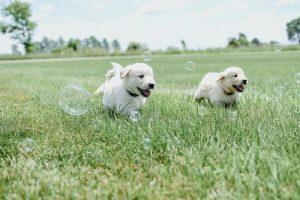
And remember, you don’t necessarily have to go out to socialise your puppy. All you have to do is familiarise them with their environment and the world around them. Don’t shelter them too much; let them out to play when guests come over so that they know how to welcome humans into their space. Invite fellow pet owners and arrange playdates for your pup to learn how to have fun with other pets. Familiarise them with common noisy sounds like car horns, thunderstorms or fireworks to desensitise them from being startled by loud everyday sounds.
- Nutrition and feeding
After around 8 weeks, you should start weaning your puppy off milk. This means it is time to start introducing more solid food to their diet.
As we said earlier; food is a very sensitive matter in puppy training. For one, puppies, like humans, have allergies, so giving them just anything to consume can be dangerous. Another point is that individual pups have their own different nutritional needs, so again, you have to be careful with what you feed them. You also have to monitor the portions of food they eat and the nutritional contents.
When selecting a diet for your pup, it’s essential to add these four key nutrients: protein, fat, calcium, and digestible carbohydrates. Proteins are crucial for growing puppies and are essential to building your pup’s tissues and muscles. Fats help to keep your pup’s skin and fur healthy and shiny, and it’s also crucial for brain development. Calcium is needed to strengthen your puppy’s teeth and bones, and digestible carbohydrates will provide your pup with energy. Other nutrients you should add to their diet are vitamins and minerals, which help boost their immune systems, and of course, water. As your pup grows, the number of nutrients they need might vary, so always make sure to monitor the effects the food they eat has on them.
Also, make sure to consult your veterinarian if you’re ever lost. They’ll be able to help you draw up a proper meal plan, give you professional insight on what your pup should be ingesting, discover food allergies and even recommend the best brands of puppy food!
- Grooming
There is a lot more to grooming than bathing your puppy and brushing their teeth. Grooming is about taking care of your puppy’s overall physical appearance, from eyes to paws.
Grooming sessions give you the opportunity to examine your dog’s fur, eyes, ears, and claws for problems. How often you need to groom your pup will also depend on its breed and type of fur. For example, some breeds are hairier and might shed more than others, thus requiring regular grooming to keep their fur neat and clean. Some other breeds may not have as much fur, and thus, their grooming sessions will be less and far between.
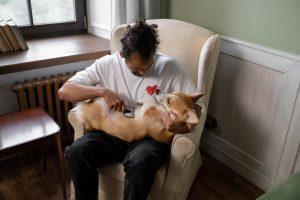
Always pick the right equipment to use to groom your pooch. An example of such equipment is a brush. Brushes vary depending on the fur type and texture, and different brushes produce varying results, so make sure you check what texture of fur your pup possesses before buying a brush.
Other steps you should incorporate into your pup’s grooming sessions include checking them daily for tics, trimming their nails, cleaning their ears weekly, and examining their eyes and the pads of their feet for injuries or skin defects. If grooming turns out to be too much of a hassle, there are professional pet groomers that will be able to make your pup look and feel their best. Schedule an appointment with them and get your pup the pampering they deserve and need!
- Puppy dental care
From as early as 6 weeks of age, you can begin brushing your pup’s teeth. It’s important to commence toothbrush training around that age to start them off right. Remember what we said about the younger pups—they’re much easier to mould. Starting the toothbrush training earlier might even help them learn to enjoy it when they’re older!
Make sure to brush your pup’s teeth as often as possible. Maybe once a week, or more if you can manage it. Just like humans, brushing the teeth daily is the foundation of good oral health.
In cases where you can’t brush your pup’s teeth daily, you can use a host of other alternatives. Dog dental sprays, for instance, are a quick solution to help achieve fresher breath. These sprays also prevent and remove tartar and plaque buildup. Another alternative is dog dental chews. They’re like breath mints for dogs and are very useful. They’re designed to have ridges that can dig into your pup’s dentition to promote blood flow in the gums, polish their teeth and reduce the buildup of tartar and plaque. Your pup will especially love these chews because they also double as treats!
If all else fails, make sure to schedule regular visits with your vet for dental appointments and cleanings. Your vet will know the right kind of dental routine your pup should subscribe to based on their dentition, gum sensitivity and other dental issues.
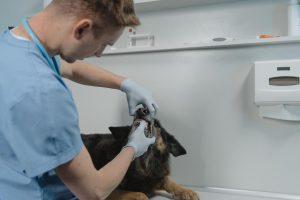
- Vaccination
Your puppy needs to be protected from potentially fatal diseases, which is why regular visits to the veterinarian to get your pup vaccinated are a must. Core vaccines are mandatory and should be given to all dogs and puppies. Non-core vaccines aren’t compulsory, but they’re important depending on the lifestyle and environment of your pup.
DHP, which stands for distemper, hepatitis, and parvovirus, and rabies are among the most important vaccines. Non-core vaccines include, but aren’t limited to, Parainfluenza, Bordetella, Lyme and Canine Influenza.
(a) DHP (Distemper, Hepatitis and Parvo) Puppy Vaccination Schedule
| First Vaccine | 6-8 weeks |
| Second Vaccine | 9-11 weeks |
| Third Vaccine | 12-15 weeks |
| Fourth Vaccine | 16-20 weeks |
| Booster DHP | 12 months after the last shot. Then as recommended by the vet. |
(b) Rabies Vaccination Schedule
This vaccine is usually required by law when the puppy is 3-6 months old. After 12 months, a booster shot is given, followed by another booster shot every 1-3 years.
(c) Non-core Vaccination Schedule
Bordetella, Parainfluenza, and Canine Influenza are vaccines that are recommended for social dogs (dogs that spend a lot of their time with other dogs in outside settings like dog shows, dog parks, etc). If your pup is more of an indoor dog, then your vet may not find it necessary to give them this vaccine.
Lyme is a recommended vaccine if you live or travel with your pup to a place where the disease is endemic.
Remember, your veterinarian has to have a full record of your pup’s medical history and vaccinations in order to know the right vaccines to recommend and give.
Finding the right veterinarian
The right vet is crucial for your puppy’s training, growth and development. After all, a good veterinarian will be in charge of your pup’s vaccination, and will even give input on the kind of lifestyle that is suitable for your pooch. The vet should be your pup’s best friend—second only to you!
Picking the right vet should have a lot to do with how qualified they are and how comfortable your puppy is around them. The services the vet offers should also be an important factor. For example, some vets only offer medical services, while others offer other veterinary services such as pet boarding and grooming.
Related: Pet boarding vs Other Alternatives: Why is boarding better?
Taking care of a puppy is hard work, but remember, it’s not something you have to do alone. With the help of a trusted veterinarian, you can relax a bit while your pup is in safe hands. Try us on for size. Dulham Veterinary Services is here for all your veterinary needs and especially your pup’s. Schedule an appointment with us today.
